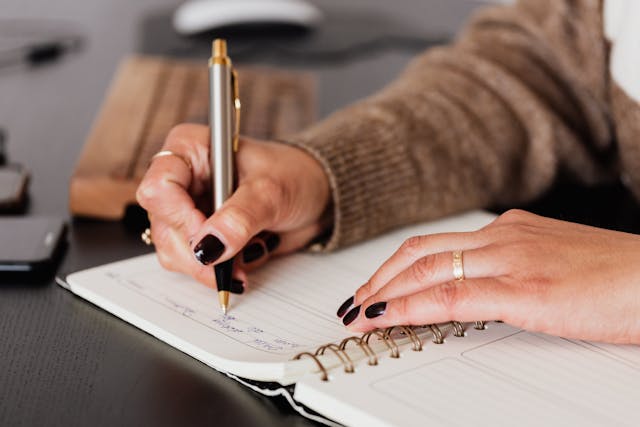Why You Should Embrace Your Vulnerability

We’ve all walked into a room not remembering what we came to get, or couldn’t think of the right word. That’s annoying, but having a bad memory can have a more serious impact on your daily life than most people realize.
Sadly, being seriously sick doesn’t just affect your body, but it often also impacts your mental functioning, from brain fog and low attention span to feeling forgetful. Poor memory can be a direct symptom of chronic illness, a side-effect of your medication, or the result of insomnia, pain or low levels of certain vitamins. More so, struggling with depression and anxiety could also lead to memory problems, just like trauma and stressful life events.
Now there’s a lot of advice available on how to improve your brain health, but when treating the underlying cause isn’t an option, how do you cope practically and emotionally when you suffer from bad memory?
Before we discuss the practical strategies, let’s first get a clearer picture of how your memory works.
In the memory process or retaining information over time, we can distinguish 3 basic stages:
As amazing as the human brain is, it has a limited capacity to process, store and recall information. In fact, research suggests that more than half of the information we come across will be forgotten within the hour. What’s more, your brain seems to actively prune memories that aren’t been used.
But when you’re feeling forgetful, you could experience problems during one or more of the 3 stages of the memory process. Maybe you didn’t fully register the information you needed to remember (encoding failure), maybe the stored information has faded from your memory (storage decay) or perhaps you have trouble accessing the stored information when you need it (retrieval failure).
For example, depression can make it hard to concentrate to notice and process sensory input, while a lack of sleep has a negative impact on connecting new information to long-term memories.
If that’s the case for you, what can you do to better deal with a bad memory, so it doesn’t keep affecting your daily life in a major way?

This article contains some affiliate links to resources you ay find useful, at no extra costs to you. All opinions are my own.
Of course, its best to treat the underlying cause of your memory problems as well as to support your overall brain health by moving your body daily, eating a healthy diet, getting enough sleep, no to moderate drinking and staying mentally active.
You should also contact your doctor if your memory problems affect your ability to work and maintain a social life, or if you notice negative changes in other thinking skills like language, reasoning and judgement.
But when your bad memory can be explained by your chronic illness, necessary medications, insomnia or mental health problems – things you cannot control or change over night – here are 3 general strategies to cope with forgetfulness:
Now let’s take a closer look at how you can put these general strategies to practice.
By implementing some memory-friendly changes to your habits and living environment, you can improve your attention needed for encoding mental input, while also making it easier to store information into memory by reducing the load of your working memory.
Here’s how you can set yourself up for success when you’re feeling forgetful:
1. Create routines you can stick to. Having some form of structure in your day or week helps you do to things on autopilot, so you don’t have to rely on your memory as much. For example, you always check if your bag contains what’s essential for you before heading out the door (without your keys). It also helps to connect new habits to existing routines, like taking your meds or supplements with meals or when brushing your teeth.
2. Get organized. Your mom was right when she told you you should “Have a place for everything, and everything in it’s place.” Put your wallet, keys, phone and glasses in the same spot each day so you don’t have to search for them all the time. It can be helpful to set up a docking station for your devices, have a key rack in the hallway or simply a bowl on the kitchen counter where you place these items.
3. Avoid distractions. It’s hard to register and process information when there’s a lot going on at the same time. So choose a quiet spot for important conversations to reduce background noise, and turn the radio or TV off when you need to focus. Also try to tackle (cognitively-demanding) chores one at a time instead of multitasking to free up mental space. That includes not checking your phone when you’re trying to work, study or do life admin.
4. Use your brain’s peak hours. When you need to get tasks done that call upon your memory – going to doctor’s appointments, following directions, making a new recipe – plan to do them during the time of the day when you’re most likely to feel mentally alert and sharp if possible.
These strategies will reduce input that interferes with your ability to focus on what you want to remember, so you can use that brainpower for registering and processing important information.

You can also apply memory techniques to better encode, store and retrieve names, addresses, passwords and new facts.
The general idea is that the more senses you use when you’re trying to remember something, the stronger the neural pathways created to retain and recall that information. For example, the dual action of reading words or text out loud and hearing yourself state those facts will help to get that information into our long-term memory.
Have a look at some well-known memory techniques you can practice in daily life:
5. Break it down. Got a lot to remember? Divide the information you need into smaller pieces. For example, you can group a phone number by pairs or memorize new routes by focusing on one landmark at every turn.
6. “Feel it, say it, do it”. Tap into multiple senses to recall whether you’ve locked the door or turned off the stove. Focus on the physical sensation of turning the key or knob for the burner, and (silently) say to yourself what you are doing (“I am locking the door/turning off the stove”) for better encoding. For visual information, you could use a similar strategy of “Look, snap, connect” to pay attention to what you want to memorize and take a mental snapshot of what you’re seeing so you form a connection between that image and the information you want to remember.
7. Repeat, repeat. Go over the names, numbers or facts you’re trying to memorize in your mind or out loud to help store the information into memory. If you’re studying a course subject, a new language or scientific terms, you get the best long-term learning results when you space out repetitions of the study material over time.
8. Make memorable associations. Link new information to something you already know. You can also create a vivid mental picture of what you’re trying to remember, such as visualizing your doctor wears big earrings in the shape of a “9” to memorize her office is on the 9th hospital floor.
9. Take a mental walk. A famous technique to memorize and retrieve lots of facts is to visualize a familiar place and picture yourself walking through this location in a fixed route. Along the way through this “memory palace” you can place things you want to remember, like which groceries to get in the supermarket. So you imagine a carton of milk by the front door, a loaf of bread on the shoe rack and apples on the kitchen counter. Another strategy to help recall information is to think of the context: where did you last see this person whose name is on the tip of your tongue?
10. Summarize. In conversations, don’t be afraid to ask for or give a short summary yourself when there’s a lot of information being discussed. “So if I understand you correctly, we’ll first do this, then that, before we end up there. Did I miss anything important?” You could also paraphrase what was said to check in whether you got all the facts you need.
Which memory technique works best for you depends on what you’re trying to remember and your unique brain functioning, so experiment with different methods to find out what helps you most.

No matter how hard you try, there will probably still be days that you’re too stressed, sleep-deprived, brain fogged or in pain to remember every appointment or item on your to-do list. That’s why memory aids like calendars, reminders and lists can be a lifesaver to make daily life with a bad memory a little more streamlined.
11. Use a calendar or diary for your daily plans. Note down all the things you have to do and place it where you can easily check it throughout the day as well as make new entries. Plus, it feels nicely productive when you can tick of your to dos!
12. Let technology be your back-up brain. Set reminders on your phone, use your alarm clock to be on time for appointments and meetings, leave voice memos for yourself and use the automatic timer on your oven so you don’t burn your food. You could also automate monthly tasks like paying subscriptions or automatic re-fills of your prescriptions.
13. Make checklists for recurring processes. Pilots and surgeons use checklists to prevent potentially deadly errors, but why not use them to make daily life easier too? On your phone or computer, write down once what you have to remember and take a look at that list each time that situation occurs. You can make a checklist for what to pack in your hospital bag, the steps you need to follow for certain work processes or school projects, or what you need to do and get when organizing a birthday party.
14. Can’t remember whether you’ve taken your meds or not? Get yourself a pill organizer sorted by weekday and by morning, afternoon, evening and bedtime to be certain, and reduce the risk of getting the wrong dose.
15. Do you tend to get lost easily? Make a photo of where you’re parked and/or the street sign. Jot down the address of where you have to go or use Google maps. As you’re walking or driving, take a mental snapshot of characterizing features along your route.
16. Got a medical appointment? Bring a trusted person to the doctor’s office with you, because two people hear and remember more than one. Studies show that patients forget 40 to 80% of medical information given immediately, and feeling ill, anxious and stressed doesn’t help either. If you’re by yourself, take a few quick notes of the main takeaways and/or ask for leaflets containing more information about the illness, procedure or treatment.
Cognitive problems like a bad memory, low attention span and lack of mental clarity are an often overlooked side-effect of living with a chronic illness, but memory problems can have a significant impact on your daily life and functioning.
Hopefully these 16 strategies above have given you some tools to better deal with forgetfulness when you can’t immediately fix the underlying cause of your bad memory. But never be hesitant to contact your doctor for tailored advice, especially if your memory problems worsen over time.
If you’re often feeling forgetful due to chronic illness or mental health problems, what helps you to cope?
You can find more helpful tips about dealing with cognitive problems in ’13 Spoonie-Proof Tips to Improve Your Attention Span’ and How to Deal with Brain Fog When Your Mind Is Clouded.